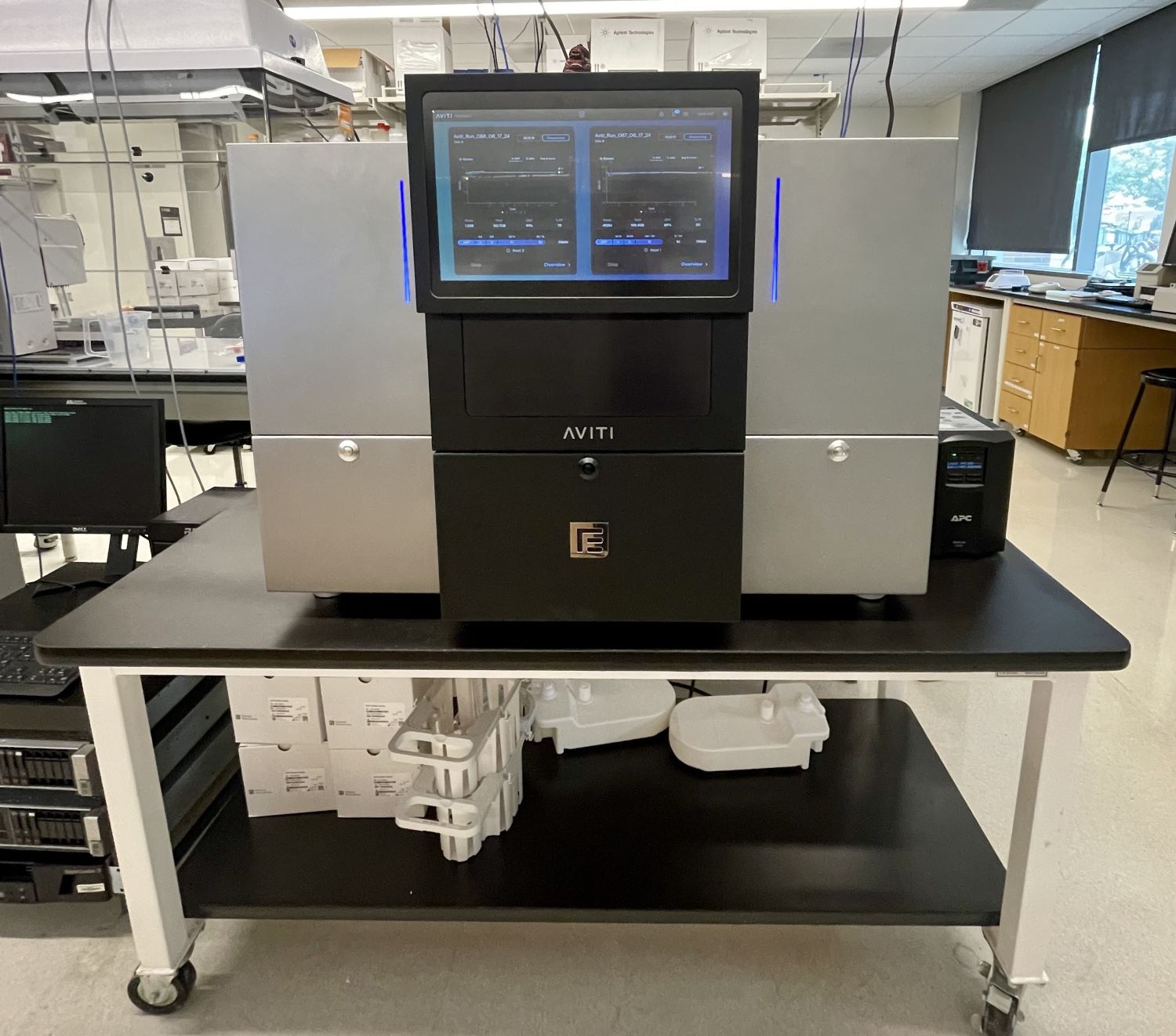2024 Public Health Laboratory Annual Report
Minnesota Chosen to Conduct Cutting-Edge Infectious Disease Research
In September 2022, the Centers for Disease Control and Prevention (CDC) announced that Minnesota was one of five states whose public health departments would receive five-year awards to conduct research and foster other innovations relating to the microbes responsible for infectious diseases. The recipients formed the Pathogen Genomics Centers of Excellence (PGCoE) network.
The Minnesota Department of Health (MDH) is partnering with the University of Minnesota, the Mayo Clinic, and the University of Pennsylvania on its PGCoE projects, which include:
 People, Pets, and Plasmids: Multi-drug-resistant organisms (MDROs) are microbes that spread disease but have evolved to become invulnerable to antibiotics and other antimicrobial agents. One type of MDRO was recently found in cats and dogs. The Minnesota Public Health Laboratory is partnering with the University of Pennsylvania School of Veterinary Medicine to examine how these MDROs can pass from pets to humans. They are also preparing for possible outbreaks and educating veterinary professionals about the danger. Read more on our People, Pets, and Plasmids page.
People, Pets, and Plasmids: Multi-drug-resistant organisms (MDROs) are microbes that spread disease but have evolved to become invulnerable to antibiotics and other antimicrobial agents. One type of MDRO was recently found in cats and dogs. The Minnesota Public Health Laboratory is partnering with the University of Pennsylvania School of Veterinary Medicine to examine how these MDROs can pass from pets to humans. They are also preparing for possible outbreaks and educating veterinary professionals about the danger. Read more on our People, Pets, and Plasmids page.
Predicting Salmonella Outbreaks: After an outbreak of Salmonella poisoning, health professionals must work very quickly to limit the spread. Many fewer people would get sick if we could detect early warning signs of the spread of a dangerous strain. The Minnesota Public Health Laboratory is assisting Dr. Tim Johnson of the University of Minnesota in his efforts to identify high-risk Salmonella strains before they make people sick. Read more on our Predicting Salmonella Outbreaks page.
 Respiratory Illness in Underserved Communities: People with fewer socioeconomic resources and those in racial/ethnic minority communities are more likely to become infected with respiratory illnesses and suffer the most severe outcomes. The Minnesota Public Health Laboratory and the University of Minnesota are addressing these disparities by building equal partnerships between community members, health care providers, and academic researchers in all stages of the research process. Read more on our Respiratory Illness in Underserved Communities page.
Respiratory Illness in Underserved Communities: People with fewer socioeconomic resources and those in racial/ethnic minority communities are more likely to become infected with respiratory illnesses and suffer the most severe outcomes. The Minnesota Public Health Laboratory and the University of Minnesota are addressing these disparities by building equal partnerships between community members, health care providers, and academic researchers in all stages of the research process. Read more on our Respiratory Illness in Underserved Communities page.
Sources of Foodborne Illness: The Infectious Disease Laboratory is developing new methods for quickly and efficiently investigating foodborne disease outbreaks. We use whole-genome sequencing and other cutting-edge techniques to determine the source of each outbreak and establish a cluster of related cases. This approach is used to combat E. coli, Salmonella, Campylobacter, and Cyclospora spp. Read more on our Sources of Foodborne Illness Outbreaks page.
 Using COVID-19 Data to Improve Disease Response: MDH is using the immense collection of data produced by the COVID-19 pandemic to answer a number of questions. How effective were COVID-19 tests over time? Could we have allocated health resources more effectively? How well did we use whole-genome sequencing, the technology largely responsible for the relatively rapid creation of the vaccine? We also are also tracking any signs of “long COVID.” Read more on our Using COVID-19 Data to Improve Disease Response page.
Using COVID-19 Data to Improve Disease Response: MDH is using the immense collection of data produced by the COVID-19 pandemic to answer a number of questions. How effective were COVID-19 tests over time? Could we have allocated health resources more effectively? How well did we use whole-genome sequencing, the technology largely responsible for the relatively rapid creation of the vaccine? We also are also tracking any signs of “long COVID.” Read more on our Using COVID-19 Data to Improve Disease Response page.
Unexplained Critical Illnesses and Deaths: Using the standard set of tests, medical examiners and clinicians are sometimes unable to diagnose a critical illness or death due to infectious disease. Often this is because people didn’t seek medical care prior to death. Resources for diagnosis can also be limited when investigating deaths that occur outside of a health care facility. These difficult cases get sent to the Minnesota Infectious Disease Laboratory, which uses advanced molecular techniques and metagenomics to discover causes of death or illness. As an otherwise unfunded program, Unexplained Critical Illnesses and Deaths expanded dramatically thanks to the PGCoE grant.
 Educational Activities: During the COVID-19 pandemic, attempts to ramp up molecular testing were hampered by the lack of employees with the necessary skills. There are still too few people in the Midwest with training on sequencing and bioinformatics platforms, such as the AVITI sequencer pictured to the left. To close the gap, the University of Minnesota, with help from the Minnesota Infectious Disease Laboratory, used PGCoE funds to develop an Introduction to Sequencing and Bioinformatics course for lab scientists. It will consist of an online, asynchronous lecture course and two-week immersion in a genomics lab and should enroll its first students for Spring 2025. Applicants must hold bachelor’s degrees in genetics, cell biology, or related fields.
Educational Activities: During the COVID-19 pandemic, attempts to ramp up molecular testing were hampered by the lack of employees with the necessary skills. There are still too few people in the Midwest with training on sequencing and bioinformatics platforms, such as the AVITI sequencer pictured to the left. To close the gap, the University of Minnesota, with help from the Minnesota Infectious Disease Laboratory, used PGCoE funds to develop an Introduction to Sequencing and Bioinformatics course for lab scientists. It will consist of an online, asynchronous lecture course and two-week immersion in a genomics lab and should enroll its first students for Spring 2025. Applicants must hold bachelor’s degrees in genetics, cell biology, or related fields.
Return to the main 2024 Annual Report page.
